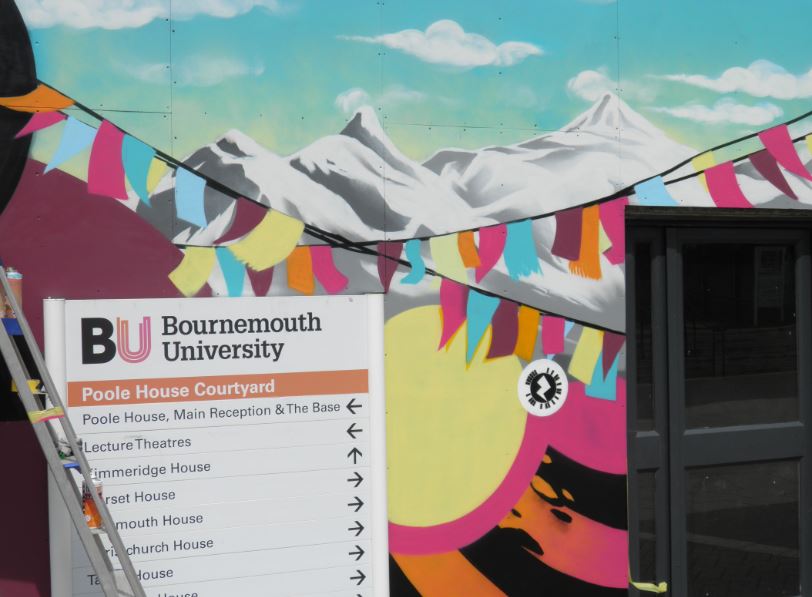 This week BU’s work in Nepal was highlighted in several ways. Most publicly on the wonderful new mural at Talbot Campus. Secondly, BU currently displays some of the entries of images to the past two years of its research photo competition. The photos show the creativity of BU’s academics and students as well as the fascinating range of research taking place at the university. One of these pictures was taken by FHSS Visiting Faculty Dr. Bibha Simkhada during fieldwork in Dhading, Nepal. The selected photos are on display in the Atrium Art Gallery until the 13th of June.
This week BU’s work in Nepal was highlighted in several ways. Most publicly on the wonderful new mural at Talbot Campus. Secondly, BU currently displays some of the entries of images to the past two years of its research photo competition. The photos show the creativity of BU’s academics and students as well as the fascinating range of research taking place at the university. One of these pictures was taken by FHSS Visiting Faculty Dr. Bibha Simkhada during fieldwork in Dhading, Nepal. The selected photos are on display in the Atrium Art Gallery until the 13th of June. 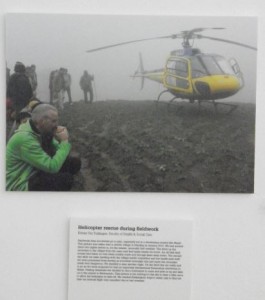
Last, but not least, another FHSS Visiting Faculty, Poole Hospital NHS Foundation Trust midwife Jillian Ireland published a blog on her involvement in the THET-funded project in Nepal. She reflects on her time as UK volunteer in Nepal. Jilly wrote: ” Three volunteers Andrea Lawrie, David Havelock and I are keen to share what we experienced in a paper sometime soon and today I will condense some of my own reflections. I wrote ‘letters’ (via email) to my Head of Midwifery, Sandra Chitty and to Senior Lecturer in Midwifery at Bournemouth University Dr. Jen Leamon while I was away, using different styles of expression to ‘get at’ my reflections from more than one angle. It helped me to separate out elements of the whole experience.”
Prof. Edwin van Teijlingen
CMMPH
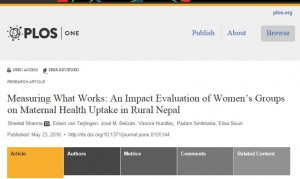

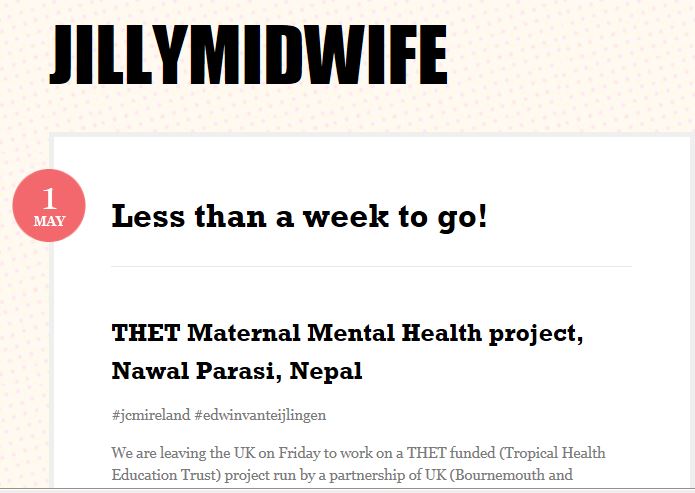
 Dr. Jenny Hall in CMMPH published her latest article ‘Facilitating learning of spirituality in midwifery’ in the academic journal Spiritual Care [1]. She highlights that there has been considerable discussion in the literature around spirituality at the end of life but little relating to childbirth. Perhaps because of this facilitation of learning around the subject is limited. The aim of this article is to raise awareness of these issues and promote future discussion and research.
Dr. Jenny Hall in CMMPH published her latest article ‘Facilitating learning of spirituality in midwifery’ in the academic journal Spiritual Care [1]. She highlights that there has been considerable discussion in the literature around spirituality at the end of life but little relating to childbirth. Perhaps because of this facilitation of learning around the subject is limited. The aim of this article is to raise awareness of these issues and promote future discussion and research.
 The April issue of the Journal of Neonatal Nursing will publish the latest article written by a combination of Faculty of Health & Social Sciences staff and Visiting Faculty. The paper ‘Experiences of fathers with babies admitted to neonatal care units: A review of the literature’
The April issue of the Journal of Neonatal Nursing will publish the latest article written by a combination of Faculty of Health & Social Sciences staff and Visiting Faculty. The paper ‘Experiences of fathers with babies admitted to neonatal care units: A review of the literature’  Doing a PhD may appeal to midwives and other NHS health professionals, but it often involves having to make difficult choices. Undertaking a part-time PhD means studying on top of a busy clinical position, but starting full-time study involves stepping away from practice, which may lead to a loss of clinical skills and confidence. The Centre for Midwifery, Maternal & Perinatal Health (CMMPH) at Bournemouth University has come up with a novel solution making it easier for midwives to undertake a doctorate while still maintaining their clinical skills. This approach is highlighted in the latest publication by Dr. Susan Way and colleagues, describing a process where CMMPH collaborate with NHS partners to apply for a match-funded PhD. [1] The first partnership was with Portsmouth Hospitals NHS Foundation Trust (PHT), with later partners expanded to cover the Isle of Wight and Southampton. Currently there are negotiations with Dorset Country Hospital NHS Foundation Trust and Poole Hospital NHS Foundation Trust. Non NHS organisations have also showed an interest with the Anglo European Chiropractic College (AECC) our likely next collaborator.
Doing a PhD may appeal to midwives and other NHS health professionals, but it often involves having to make difficult choices. Undertaking a part-time PhD means studying on top of a busy clinical position, but starting full-time study involves stepping away from practice, which may lead to a loss of clinical skills and confidence. The Centre for Midwifery, Maternal & Perinatal Health (CMMPH) at Bournemouth University has come up with a novel solution making it easier for midwives to undertake a doctorate while still maintaining their clinical skills. This approach is highlighted in the latest publication by Dr. Susan Way and colleagues, describing a process where CMMPH collaborate with NHS partners to apply for a match-funded PhD. [1] The first partnership was with Portsmouth Hospitals NHS Foundation Trust (PHT), with later partners expanded to cover the Isle of Wight and Southampton. Currently there are negotiations with Dorset Country Hospital NHS Foundation Trust and Poole Hospital NHS Foundation Trust. Non NHS organisations have also showed an interest with the Anglo European Chiropractic College (AECC) our likely next collaborator.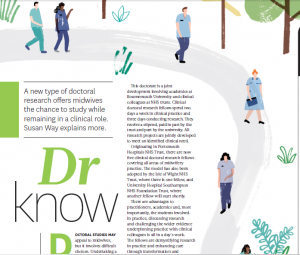
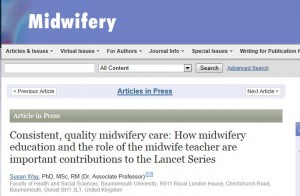
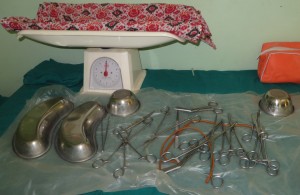
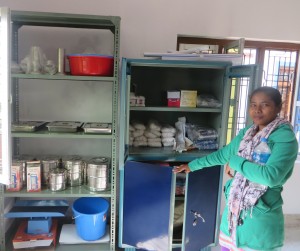

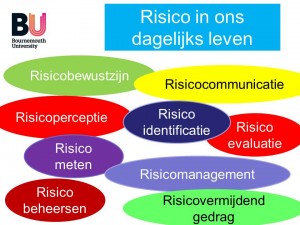

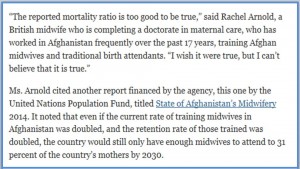

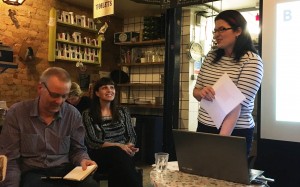

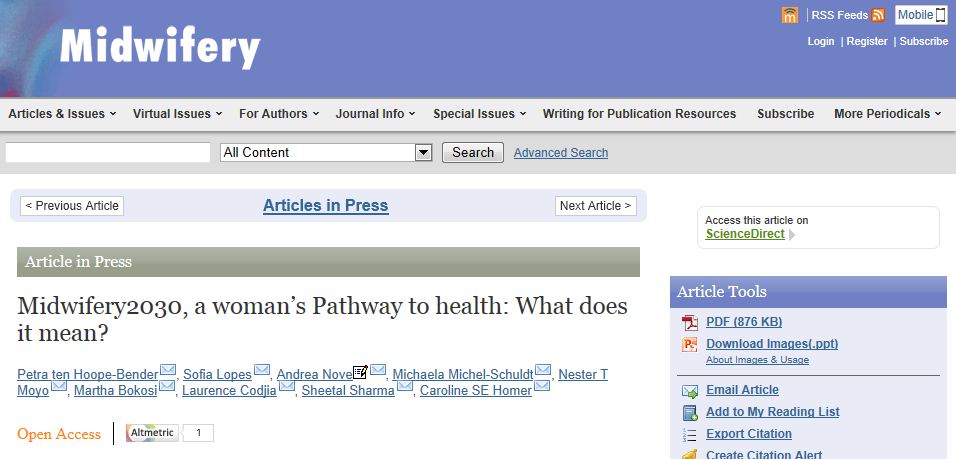
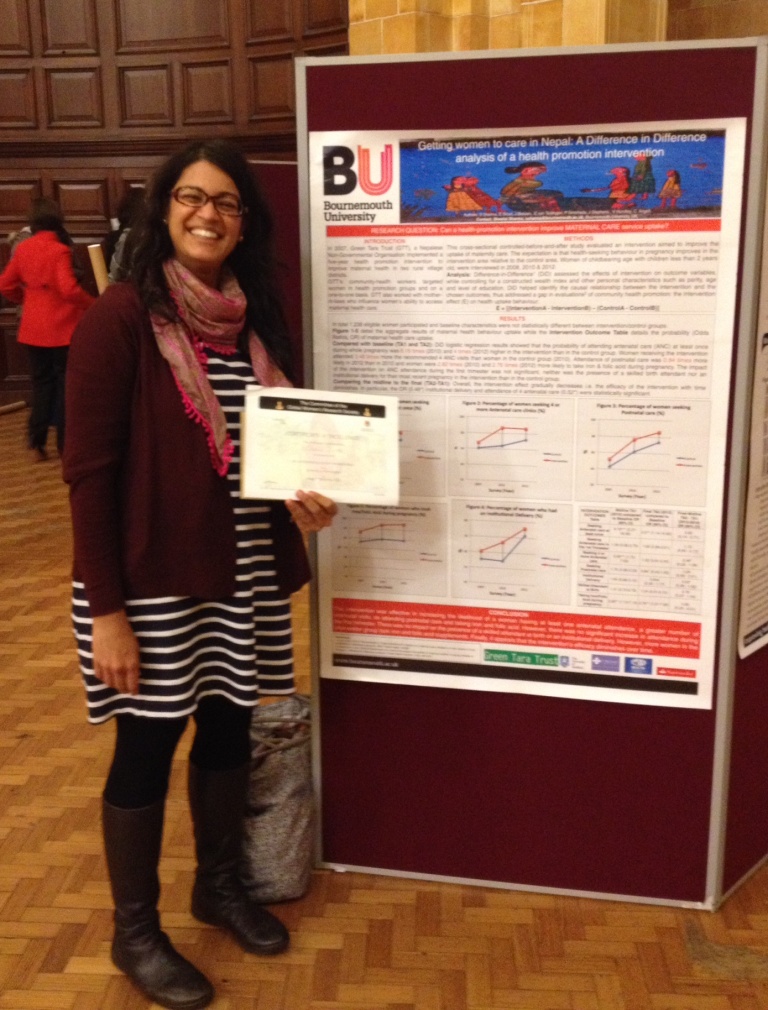
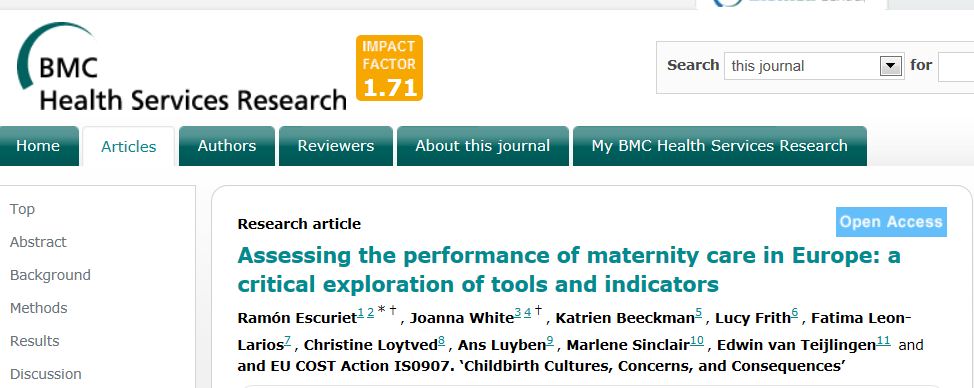
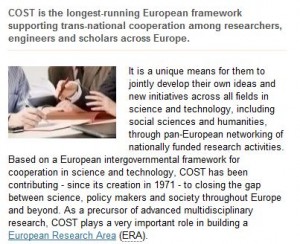


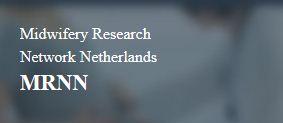












 SPROUT: From Sustainable Research to Sustainable Research Lives
SPROUT: From Sustainable Research to Sustainable Research Lives BRIAN upgrade and new look
BRIAN upgrade and new look Seeing the fruits of your labour in Bangladesh
Seeing the fruits of your labour in Bangladesh Exploring Embodied Research: Body Map Storytelling Workshop & Research Seminar
Exploring Embodied Research: Body Map Storytelling Workshop & Research Seminar Marking a Milestone: The Swash Channel Wreck Book Launch
Marking a Milestone: The Swash Channel Wreck Book Launch ECR Funding Open Call: Research Culture & Community Grant – Application Deadline Friday 12 December
ECR Funding Open Call: Research Culture & Community Grant – Application Deadline Friday 12 December MSCA Postdoctoral Fellowships 2025 Call
MSCA Postdoctoral Fellowships 2025 Call ERC Advanced Grant 2025 Webinar
ERC Advanced Grant 2025 Webinar Update on UKRO services
Update on UKRO services European research project exploring use of ‘virtual twins’ to better manage metabolic associated fatty liver disease
European research project exploring use of ‘virtual twins’ to better manage metabolic associated fatty liver disease